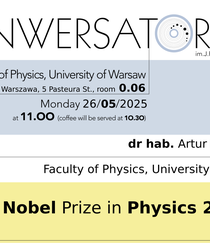
Open lecture
The Jerzy Pniewski and Leopold Infeld Colloquium: "The Nobel Prize in Physics 2024"
dr hab. Artur Kalinowski, prof. UW
Wydział Fizyki, Uniwersytet Warszawski
May 26, 2025, 11 a.m.
ul. Pasteura 5, sala 0.06
The Jerzy Pniewski and Leopold Infeld Colloquium of the Faculty of Physics will be held in room 0.06 on Monday, May 26, at 11:00 AM.
The lecture entitled:
"The Nobel Prize in Physics 2024"
will be delivered by:
dr hab. Artur Kalinowski, prof. UW
Faculty of Physics, University of Warsaw
In October 2024, the Nobel Prize in Physics was awarded to John Hopfield and Geoffrey Hinton “for their fundamental discoveries and inventions that enable machine learning using artificial neural networks.” The selection raised controversy and questions about the contribution of machine learning to the development of physics. This issue will be the subject of the upcoming Colloquium.
The abstract of the Colloquium can be found below this news item.
The lecture will be held in English.
Before the Colloquium, from 10.30 AM, please join us for informal discussions over coffee and cakes in the lobby outside room 0.06.
The next and last Colloquium this semester will be held on June 9, 2025.
We invite you to these events.
With best regards,
Barbara Badełek
Jan Chwedeńczuk
Jan Kalinowski
Jan Suffczyński
---
Abstract:
Machine learning (ML) is one of the fastest growing disciplines on
the border between science and industry. The number of ML related articles
on arXiv follows closely the Moore's law [1]. A large part of the progress (we are aware of) happens in private corporations, outside academia - ask yourself who invented ChatGPT [2], Gemini, the product recommendation system of a huge selling company with a name starting on A, etc. It seems that the Nobel Committee has acknowledged the importance of machine learning, and awarded the 2024 Prize in Physics “for foundational discoveries and inventions that enable machine learning with artificial neural networks” [3], and the Prize in Chemistry for "Computational Protein Design and Protein Structure Prediction" - a machine learning based model predicting protein shapes [4]. In my lecture, I will present the connection between machine learning and physics, and give a random overview of the application of ML methods in physics.
[1] M. Krenn, L. Buffoni, B. Coutinho, et al, arXiv:2210.00881 [cs.AI]
[2] A Radford, K. Narasimhan, et al, (no formal citation exists for this
breakthrougharticle) https://cdn.openai.com/research-covers/language-unsupervised/langu age_understanding_paper.pdf
[3] Nobel Prize Outreach 2025. Wed. 14 May
2025, https://www.nobelprize.org/prizes/physics/2024/advanced-information
[4] Nobel Prize Outreach 2025. Wed. 14 May2025, https://www.nobelprize.org/prizes/chemistry/2024/advanced-information
2025-05-26_Colloquium_poster - poster
